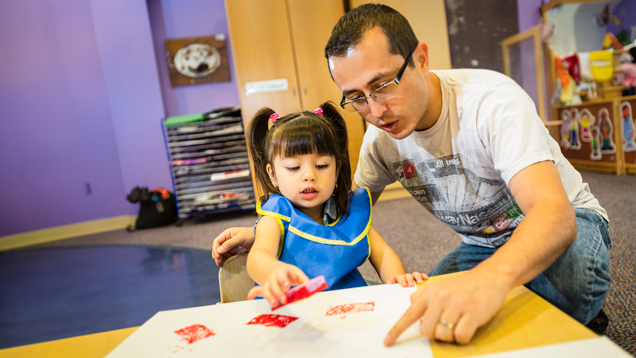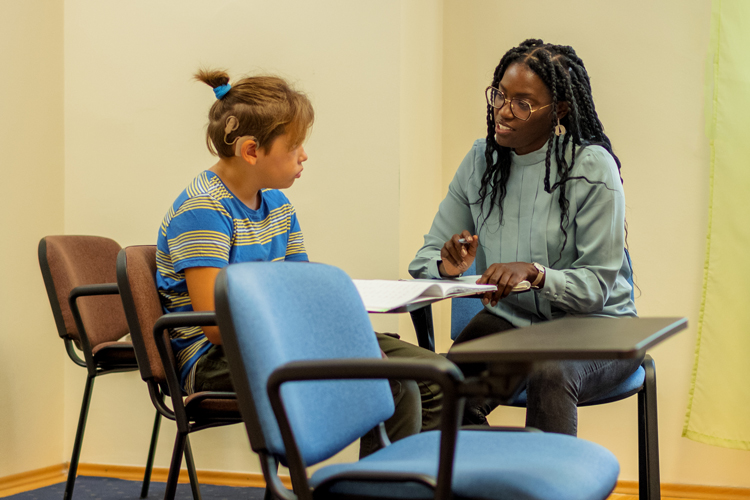Millions of children and adults in the United States have one or more developmental disabilities. Help empower them to lead full, active lives with a master's degree from Nova Southeastern University.
Gain the skill set to manage and improve the programs and services that they depend on. This program will mold you into a leader who can address relevant issues head-on at community-based and governmental agencies. With flexible curriculum offerings, advance your career as you advocate for others.
Choose the Applied Behavior Analysis concentration to prepare for the Board Certified Behavior Analyst® (BCBA) examination.
The Master of Science in Developmental Disabilities program at Nova Southeastern University provided me with tremendous knowledge and ability to serve individuals and families affected by developmental disabilities. In my role as a nurse practitioner, I use the information gained in this program on a daily basis.
Sheresa Campbell | M.S. Developmental Disabilities
Quick Facts
What Can You Do With a Master’s Degree in Developmental Disabilities?
Prepare for a rewarding career in private, public, and nonprofit sectors as a:
- Program Director/Coordinator
- Early Childhood Interventionist
- Developmental Specialist
- Case Manager
- Behavior Analyst
- Child Life Specialist
- Vocational Counselor

M.S. in Developmental Disabilities Curriculum
This graduate degree offers a comprehensive curriculum that examines different developmental
disabilities, the challenges disabled individuals face during their life, and the
support systems they depend on. Gain a scholarly foundation to build on as you focus
your degree with a concentration. Apply what you learn to real-life cases and settings
through fieldwork opportunities.
This master's program comprises 30 credits: 21 credits (7 courses) of core curriculum and 9 credits (3 courses) of a specialty concentration. If you wish to prepare for national certification, additional practicum or internship courses may be required.
To see real-time course offerings, view NSU’s entire course catalog on Course Wizard.
Required Courses (21 Credits)
Credits
Concentration Tracks
Garner an understanding of different theoretical perspectives on aging and disability; how students with developmental disabilities experience higher education and how to better access outcomes; and how to help those with developmental disabilities live independently and thrive in society.
Curriculum
Required Courses for Concentration(9 Credits Total)
Credits
Receive a comprehensive understanding of applied behavior analysis concepts and principles and prepare for the Board Certified Behavior Analyst® examination.
Curriculum
Choose Three Courses (9 Credits)
Credits
*Students seeking BCBA certification must complete a minimum of seven (7) courses (21 credit hours) to a maximum of ten (10) courses (30 credit hours) in the ABA concentration.
This program has been designed to meet the Board Certified Behavior Analyst (BCBA) Pathway 2 coursework requirements. Applicants will need to meet additional requirements to qualify for BCBA certification. Learn more about the BCBA certification requirements at https://www.bacb.com.
Click here for more information about the BCBA examination pass rate. Please note, pass-rate data are not published for sequences with fewer than six first-time candidates in a single year or for sequences within their first four years of operation.
 Gain an understanding of child life practices within pediatric health care; ethical
issues within pediatric health care; working with families in health care settings;
theories regarding child and adolescent development; and other theories and practices
that are necessary to learn to provide care in a pediatric health care setting.
Gain an understanding of child life practices within pediatric health care; ethical
issues within pediatric health care; working with families in health care settings;
theories regarding child and adolescent development; and other theories and practices
that are necessary to learn to provide care in a pediatric health care setting.
Curriculum
Choose Three Courses (9 Credits)
Credits
Elective Clinical Training
Credits
*Students seeking CLS certification must complete a minimum of nine (9) courses (27 credit hours) to a maximum of twelve (12) courses (36 credit hours) in the Child Life concentration.
The Association of Child Life Professionals (ACLP) has pre-approved these courses toward Child Life Professional Certification Examination requirements. Applicants will need to meet additional requirements before they can be deemed eligible to take the examination. Learn more about certification requirements at https://www.childlife.org/certification.
Learn how to treat young children with developmental disabilities and provide early intervention so they can overcome difficulties and thrive. Also learn about the historical and current practices in integrating students with developmental disabilities into the classroom.
Curriculum
Required Courses for Concentration (9 Credits Total)
Credits
Gain a comprehensive understanding of grant writing and learn how to effectively develop critical-thinking and writing skills; how public policies affect people with developmental disabilities and their access to services; and current trends affecting disability policies and policy making.
Curriculum
Required Courses for Concentration (9 Credits Total)
Credits
Additional Information
Students seeking to establish eligibility for the Board Certified Behavioral Analyst (BCBA) or Association of Child Life Professionals (ACLP) exams have the option of taking additional courses as needed in the Applied Behavior Analysis and Child Specialist concentrations.
Related Degrees
Looking for a degree that will allow you to better your organization or community? Check out these programs.
M.S. in Education—Exceptional Student Education
Gain the specialized knowledge and skills to serve K–12 students with disabilities or work in a disability-specific field. 36 credits to complete; offered completely online.
Prepares you to:
Advocate for those who need it most
Be an expert in a specific disability category or combination of categories
M.H.S. in Child Protection
Develop the critical knowledge, values, and skills necessary to respond effectively to complex problems confronting children and families. 30 credits to complete; offered completely online.
Prepares you to:
Give children the support they need
Lay a strong foundation in a child’s life
Close the gap between theory and practice
Admission Requirements
Ready for the Next Step?
We’re thrilled you’re applying to NSU’s M.S. in Developmental Disabilities degree program.
Applications for admission are accepted online and on a rolling basis throughout the calendar year.
Have the following items ready to submit with your online application:
- $50 application fee
- Transcripts from all schools attended
You will also be asked to complete an interview conducted virtually or via telephone.
Applicants who have attended foreign universities or colleges are required to have their academic credentials evaluated for U.S. institutional equivalence. Please visit the National Association of Credential Evaluation Services for more information. International students are encouraged to contact the Office of International Student Services at (954) 262-7240 or 844-701-3925, ext. 27240, or by email at intl@nova.edu, or visit the Office of International Students and Scholars.
Applied Behavior Analysis (ABA) Fellowship
With NSU’s ABA Fellowship, accrue hours toward the Behavior Analyst Certification Board’s (BACB) concentrated supervised fieldwork category while employed at NSU’s Baudhuin Preschool. As a fellow in this program, you will be eligible for tuition reduction contingent upon six months of successful employment.
This two-year fellowship lets you immediately bridge theory to practice with the oversight of the University. Two fellows will be selected for each two-year cycle, with the next cycle beginning Fall 2026. This two-year tenure will align with the Broward County Public Schools academic and extended school year calendars.
At the conclusion of the fellowship, fellows will have accumulated the necessary fieldwork hours toward Board Certified Behavior Analyst (BCBA) certification exam eligibility.
Students enrolled in NSU’s master’s-level ABA concentrations are eligible to apply for the ABA Fellowship Program.
Applicants must meet the following criteria:
- Demonstrated interest and commitment to working with children and families
- Articulated motivation to pursue a career in ABA
- Preference will be given to applicants with a grade point average (GPA) of 3.2 or higher in the last 60 semester hours of undergraduate coursework
- Ability to work full time in the United States throughout the course of the fellowship (2 years
- Ability to pass both Broward County Fieldprint Fingerprinting and Department of Children and Families (DCF) Clearinghouse level-2 background checks
- Ability to pass the 90-day probationary period; extensions of the probationary period will be granted only in exceptional circumstances when there are extraordinary reasons beyond the student’s control and have been discussed with the Program Supervisor in advance of the probation deadline
- Ability to maintain satisfactory academic standing and work performance throughout
the duration of the ABA fellowship
Preferred Skills:
- Experience with children with Autism Spectrum Disorder (ASD)
Applications must include all of the materials listed below. Incomplete or late applications will not be considered.
- Completed Fellowship Application
- Resume/CV
- Two academic and/or professional references
Email completed packages using the subject line “Fellowship Application: Last Name, First Name” to tarashee@nova.edu.
March–May: NSU accepts application
May 1, 2026, 11:59 p.m. (ET): All application materials due
May 1, 2026 – June 1, 2026: Finalist selection and interviews
June 2, 2026: Selected Fellows notified
June 14, 2026: Deadline for Fellows to accept or decline the offer
June 15, 2026: Onboarding of Fellows
August 1, 2026: Estimated Start Date
NSU ABA Fellows must successfully complete 45 hours of Child Care Training within six months of employment, participate in all ESE Teacher Aide trainings, and maintain a 3.5 GPA and satisfactory employee performance throughout the course of the fellowship.
For more information, contact Dr. Tara Sheehan tarashee@nova.edu.


